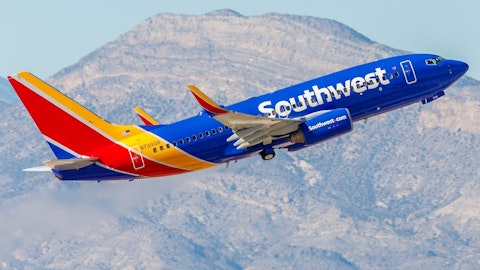Operator: Thank you. Our next question comes from the line of Scott Group of Wolfe Research. Your question please, Scott?
Scott Group: Hi. Thanks. Good morning. Sorry, I lost my voice. But hopefully, you can hear me. I just want to go back to the third quarter guide. So we’ve just never seen margins go from 15% to 8% to 10%, down 5 to 7 points from Q2 to Q3 — just any more color to help us think about what’s driving that?
Robert Isom: Hi Scott. Again, I’ll tack on to both Vasu’s comments and Devon’s as well. We’re looking at our results over the course of the year. The recovery, as we’ve seen it has been not exactly smooth on a quarter-to-quarter comparison basis. As we take a look at the year, you can depend on us to produce those results. We’re really proud of those. And it’s indicated by us, again, moving our EPS guide up as we did this morning.
Scott Group: Okay. And then just to clarify, is there — are we assuming any earnings impact from losing the NEA, which I know it sounds like you don’t think we go back to where we were. But — is there any earnings impact going forward from losing NEA?
Robert Isom: Scott, we’re not anticipating any earnings impact.
Scott Group: Okay. Great. All right. Thank you, guys.
Operator: Thank you. Our next question comes from the line of Conor Cunningham of Melius Research. Your line is open, Conor.
Conor Cunningham: Hi, everyone. Thank you for the time. Not a lot of talk on blended travelers or blended itineraries this quarter. Just curious on — is that just because it’s in your base now? And maybe you could just level set us on how you’re thinking about large corporate in the back half of 2023. Thank you.
Vasu Raja: Hi. This is Vasu and thanks for the question. And you’re exactly right. It’s less of a novelty now. This is just part of our base, how the business runs for several quarters now. We’ve seen a mix of 35% leisure style travel, 35% blended style travel, 30% stuff. And furthermore, within the 30% business, there’s roughly a 2:1 split between unmanaged travel and managed travel that’s there. That’s been pretty consistent for several quarters now. It looks to be pretty consistent going into the future. Certainly, that’s what our forward book says. So, that’s why no commentary. This is actually how the business operates now.
Conor Cunningham: And just where you’re thinking about corporate, sorry?
Vasu Raja: Look, we’ve seen corporate — first of all, I’ll clarify this. When we talk about business, we talk about people on business style trips. And within that, there’s two groups, there’s individuals and companies that fly and they don’t manage or buy their travel centrally, and then there’s large corporations that tend to man it by their travel centrally. We’ve seen that those customers who were managed, they buy their travel centrally has — it’s recovered to 80% of historical levels. And that’s been pretty much plateaued for several quarters now. However, unmanaged demand continues to grow in our system. And indeed, total business revenues have really regained their 2019 composition in the system. So we remain encouraged on business demand. Should things change, we’re prepared to go and adjust accordingly. But no forward change to outlook is any different than the stuff we’ve been experiencing.
Conor Cunningham: Okay. And then just on the competitive environment in the domestic market, the ULCCs and LCCs have been ramp in capacity in the back half and a lot of that’s hit in your hubs. I’m just curious on how you view the competitive landscape right now as you think about the back half of 2023. Thank you.





